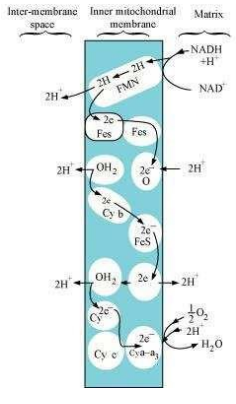6. Explain ETS.
ETS or electron transport system is located in the inner mitochondrial membrane. It helps in releasing and utilizing the energy stored in NADH+H+ and FADH2. NADH + H+, which is formed during glycolysis and citric acid cycle, gets oxidized by NADH dehydrogenase (complex I). The electrons so generated get transferred to ubiquinone through FMN. In a similar manner, FADH2 (complex II) generated during citric acid cycle gets transferred to ubiquinone. The electrons from ubiquinone are received by cytochrome bc1 (complex III) and further get transferred to cytochrome c. The cytochrome c acts as a mobile carrier between complex III and cytochrome c oxidase complex, containing cytochrome a and a3, along with copper centres (complex IV).
During the transfer of electrons from each complex, the process is accompanied by the production of ATP from ADP and inorganic phosphate by the action ATP synthase (complex V). The amount of ATP produced depends on the molecule, which has been oxidized. 2 ATP molecules are produced by the oxidation of one molecule of NADH. One molecule of FADH2, on oxidation, gives 3 ATP molecules.


© 2026 GoodEd Technologies Pvt. Ltd.